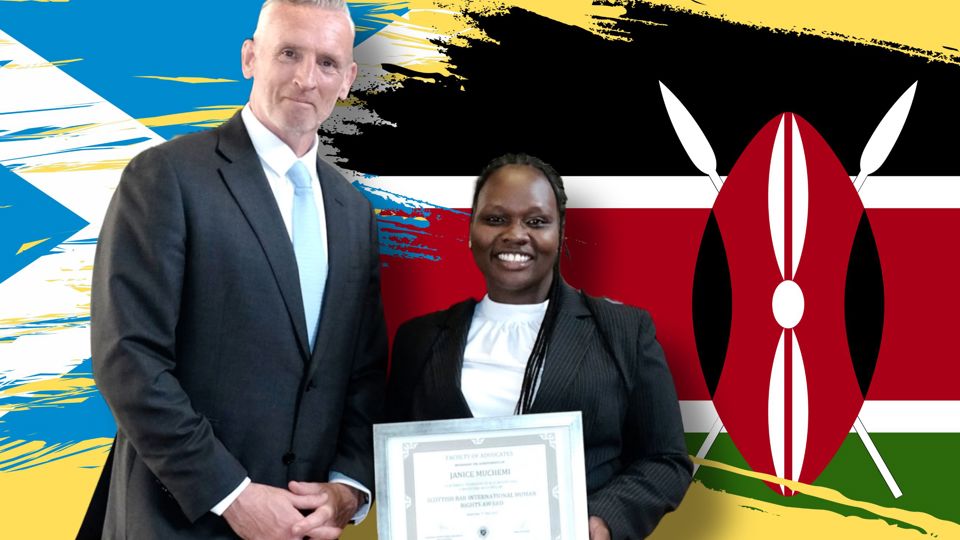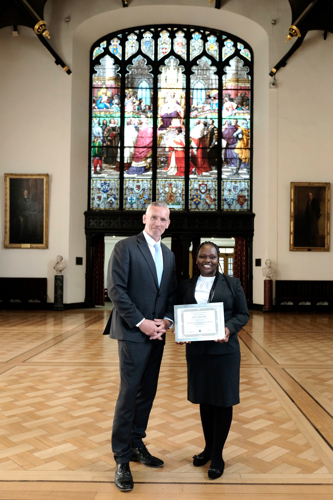Her colleagues and client were tortured and killed — but Janice Muchemi is not afraid to stand against abuse of power

When Janice Muchemi's colleagues were murdered by police, this Kenyan attorney embarked on a journey to defend human rights and stand up for victims in the justice system.
In the summer of 2016, Kenyan human rights lawyer Willie Kimani was abducted alongside his client, Josephat Mwendi and their taxi driver, Joseph Muiruri. Two weeks later, their bodies – bound, mutilated and bearing signs of torture – were recovered from a river. They had been murdered.
At the time of their deaths, Kimani was involved in work to combat police violence and abuse of power and he, as well as Mwenda and Muiruri, fell prey to the very injustice he was fighting to end. It took seven years before the perpetrators were brought justice but in the end – thanks to the diligence of Kimani’s colleagues from the International Justice Mission (IJM) – three police officers and a civilian were convicted of the kidnapping and killings.
The savagery of the incident sparked fresh anger about the practice of extrajudicial killings in Kenya, and one of those who risked it all to make sure the perpetrators were held to account was a fellow IGM attorney, Janice Muchemi.
Now Muchemi, an advocate of the High Court of Kenya who has been actively litigating for the IJM for seven years, has been recognised by the Scottish legal profession. She was chosen from dozens of candidates to be named the winner of the Scottish Bar International Human Rights award for 2024-25. It is an award which recognises lawyers who uphold human rights and defend the rule of law all around the world.
The Right Honourable Lord Bonomy, a former judge of the United Nations International Criminal Tribunal for the former Yugoslavia, was chair of the judging panel. He said: “This year’s award saw a strong field of candidates with nearly 40 applications being received. They included lawyers, journalists, youth activists, and artists. Some were working in their own countries, others were living in exile. They spanned the globe with applications from North, Central and South America, East, Central and South Asia, Oceania, Africa and Europe.

“Among that strong field, our award winner this year stood out. Janice Muchemi represents victims of violence against women and children and victims of police abuse of power through the criminal justice system. But her work is not confined to the courts. She also promotes reforms to policy and practice to accommodate the plight of victims and is engaged in advocacy programmes to promote awareness of victims’ rights so as to protect the poorest and most vulnerable members of society against abuse.”
Janice Muchemi’s story in her own words
As the winner of this year’s award, Muchemi has embarked on a visit to and tour of Scotland. She caught up with the Journal after spending some time in the capital ahead of the awards ceremony, having just explored Edinburgh’s Royal mile.
Muchemi spoke first about her work at the IJM, and then more broadly about the rule of law in Kenya and further afield:
Joshua: Let’s start with your recent work, can you talk us through the kind of cases you have?
Janice: For the last 10 years, I have been an advocate representing victims of police abuse of power and violence against women and children through the Kenyan criminal justice system. victims of extra judicial killings and other human right violations occasioned by police including the big case of Willie Kimani. This will include everybody and not just children.
Joshua: I wanted to talk about the case with your colleague, Willie, and Joseph and Josephat. That legal process went on for a very long time.
Janice: So when I joined IJM in 2015 when we were trying to pilot our Police Abuse of Power project (PAP). So it was the team that was brought in, together with another colleague to see the landscape, to conduct a bit of assessments, come up with good partnerships and strategies on how to embark on this project.
Unfortunately, [Willie] took on one case that appeared to be quite risky, as we saw, because in 2016 as they were attending the court case with the client, they were abducted together with a taxi driver, where they were held incommunicado, tortured, killed, and their bodies dumped in a very rocky river.
So because of that, we were able to call for help publicly, and were able to get investigations to be done by the law enforcement agencies. And the case finally ended up in court, and we were I represented IJM in that case, standing in for the organization, and through seven years, we did the criminal trial, and at the end, we got four out of five convictions, and they're serving several sentences in custody right now.
Joshua: It's quite an incredible story. How does a case like that make you and your colleagues feel, that's another person working with the mission as a lawyer who's at risk because of the work that he was doing.
Janice: So it has the both the positive and the negative. In 2016 of course, we were very frightened. We thought that maybe we were doing something wrong and that we were all at risk, but then it made us aware that there were so many people who were suffering, because after this happened and made it public, we received so many complaints of Kenyans coming to report to us we're also in this situation. This has happened to us. What do we do?
And so we realised that Willie was spot on. He had noticed something, and he was on the right track. So in the issue of risk and threat, IJM Kenya was able to develop a security manual, and we have a department that is in charge of security around the around the project, so they are aligned to the fact of threats and risk, especially when people go out to represent clients, because this was not something we had foreseen, and it's bad that it ended we did because we really miss Willie and so, yeah, we do a lot of trainings when it comes to our security. We do a lot of investigations and assessments before we go out.
We have also developed partnership with the various government actors in the system and we support them through capacity building and advocating for proper resourcing. We do not attack the governments, we work alongside them to better the system for everyone.
Joshua: And have you seen change? Do you feel that things have changed in Nairobi and in Kenya more generally?
Janice: 100 per cent. We have very many wins. Because in 2016 when the case happened, we only had two officers who had ever been prosecuted for human rights violations. Right now, we are up to above 50, so it is becoming a norm where the community is actually reporting these violations, and there's an independent policing oversight authority that is carrying out the investigations.
These cases are going to court, and we're getting positive judgments on the court system. So, what this is bringing about is deterrence. So you've seen a reduction of everyday violence by the police when they're conducting the operations in public. What we are now seeing is isolated incidents, for example, when you have protests on the streets and the police respond in a very unwarranted manner where they use excessive use of force. But because of the advocacy we've done around it we can call for accountability on behalf of the victims
International Media has picked it up. We recently got a BBC coverage of a protest last year that is causing an uproar back home. So we have seen a lot of media publicity around violations by the police, and then we have caused a lot of deterrence in terms of human rights violations by the National Police Service.
Joshua: What do you tell people outside of Kenya about the work that you do? Is there a message that you pass on, lessons that you've learned from your work that maybe apply elsewhere?
Janice: Yes, one is that victims have a right, have a right to be represented within a criminal trial, and have a right for their voices to be heard. What you've experienced is a criminal trial is primarily the prosecution, which represents the state and the accused person. But the reason why it is there is because someone was harmed, and that person was a victim. Most jurisdictions call it the complainant.
For example, in Scotland, you do not have victim representation that is active in criminal trials, and we have tested it back in Kenya, and it is working for the benefit of the vulnerable in society. So that is one of our aims, is to empower people on victim accompaniment and empowerment, and also trauma informed care, because some of these people are very vulnerable, and if we don't give them trauma informed services right from the law enforcement, people that get in touch with the complainants, prosecution and judiciary, and also trauma informed lawyering, which is very important for advocates, then you're going to victimize these vulnerable people, and they're going to shy off from getting justice.
So our second message is trauma informed care for people who are vulnerable. And three is that people need to advocate for their services from the government, whichever jurisdiction you deserve these services, and it is not it is by right. So we should not rely on external people to come and tell you that, hey, your right is being violated, and this is wrong, and you need to do something about it. You need to empower communities, start cultural change to enable people to speak out in something as well and get the assistance they deserve.
Joshua: Something we've talked a lot about here and in is the idea of the rule of law and of governments respecting courts and lawyers. In Kenya, do the people believe that the law protects them.
Janice: Unfortunately, the government of the day dictates at what extent this law will protect them, and so what we've seen in the recent past is a lot of interference with the judiciary in that independence is under threat.
Recently, we saw the our Chief Justice, who's the head of the judiciary, complaining that security has been withdrawn. This is because of a very huge case that the government had high stakes in, and so with, from our point of view, that is interfering with the court business and trying to influence the Court's decisions.
We have very many cases of contempt of court by government, because if we refuse to obey orders, and nothing can be done about it. So the issue of independence of the judiciary is also the same back in Kenya, and we're still struggling with it.
Governance is a huge thing, and it depends on the person who's sitting at that seat, if they're pro government or against it. So it's not the same. Every time we have elections and new government in place, you have to sit and wait to see how they going to treat our other arms of government. A lot of uncertainty around that, yes, a lot of interference with independence, yes.
Joshua: But you sound broadly quite hopeful for the future, that change is happening?
Janice: We have celebrated a lot of wins. They may not be big, but we have had an impact in policy. We have had an impact in the laws that are being passed. We are targeting mental wellness for police, which they have embraced wholly, and they are seeking help for any issues that they might have. We have seen reduction of cases of police brutality back home — except where now we are trying to figure out how to deal when it comes to protests and during elections. But during everyday operations, we have seen reductions.
We have seen increase in convictions which is bringing about deterrence about violations. Even in the violence against women and children, we've released policies court-specific, we have provided safe places where people can be interviewed and people can get help, and we have very many ambassadors around Kenya, who are advocating for this together with us.
There’s a lot to be happy about, because we have very many means that we can celebrate. We are not yet there, because we want to see if the system can function without assistance, and that is a matter of priority by the government. And so we need to get political will behind us, and that takes time, but I'm hopeful it will happen.
Joshua: It's nice to hear a bit of hope, positivity for the future. One final question, what would you say to a teenager, a youngster who was thinking about a career in law in Kenya, what kind of advice would you have to them? If someone said to you, ‘Janice, I want to be a lawyer in Kenya. I want to do what you do’, what advice would you have for them?
Janice: I would say, get to school, get the books. Read, work hard. But what is out here is different from what you learn in in the classroom. Out here you're going to be handling clients, and, yeah, practice is different, because you have to get involved.
And if your mind is set at making a making a difference, bringing change to your community, then you have to be wholly, wholly involved in the legal profession. There's space for every one of us to make a difference, however small, however big. So the legal profession is it takes long to get here, but once you get here, it is totally worth it all the nights reading and passing exams is totally worth it.
What the judges said about Janice Muchemi’s human rights work
Welcoming guests to the awards ceremony this week, Dean of Faculty Roddy Dunlop KC said the Scottish Bar International Human Rights Award aimed to “honour and celebrate the human rights defenders working across the world in difficult circumstances.” This year’s winner was chosen after a vigorous selection process was used to sift through exceptionally strong applications, he added.
Mr Dunlop sat on the selection panel for the award alongside Professor Alan Miller, Professor of Practice in Human Rights Law and Independent Expert with the UN Development Programme Crisis Bureau, Treasurer of the Faculty of Advocates Ruth Crawford KC, and Shelagh McCall KC, Convenor of Faculty’s Human Rights and Rule of Law Committee.
Shelagh McCall KC said: “It has been a real pleasure to host Janice Muchemi here in Scotland. Her work to tackle police brutality and combat impunity is inspirational. It reminds us how important it is to stand in solidarity with lawyers working on the front line, where standing up for human rights can literally be life threatening.”
“Here in Scotland, we can become complacent about what it means to work to protect human rights. Whatever challenges we face here, our lives are not in danger for simply trying to obtain justice for victims. The Scottish Bar International Human Rights Award is our chance to recognise colleagues working in far more difficult circumstances. Janice is a worthy recipient. She must be an incredible advocate to have on your side, and we are pleased and humbled to stand at her side in support of her work.”
All about the International Justice Mission (IJM)
The IJM is a global body based out of Washington DC which works to protect people living in poverty from violence by improving criminal justice systems, helping survivors and holding criminals accountable.
The organisation is non-partisan, non-government and works in partnership with local authorities and NGO partners to deliver its programmes. In Kenya, the IJM is focused on two casework programmes: Police Abuse of Power and Violence Against Women and Children.






